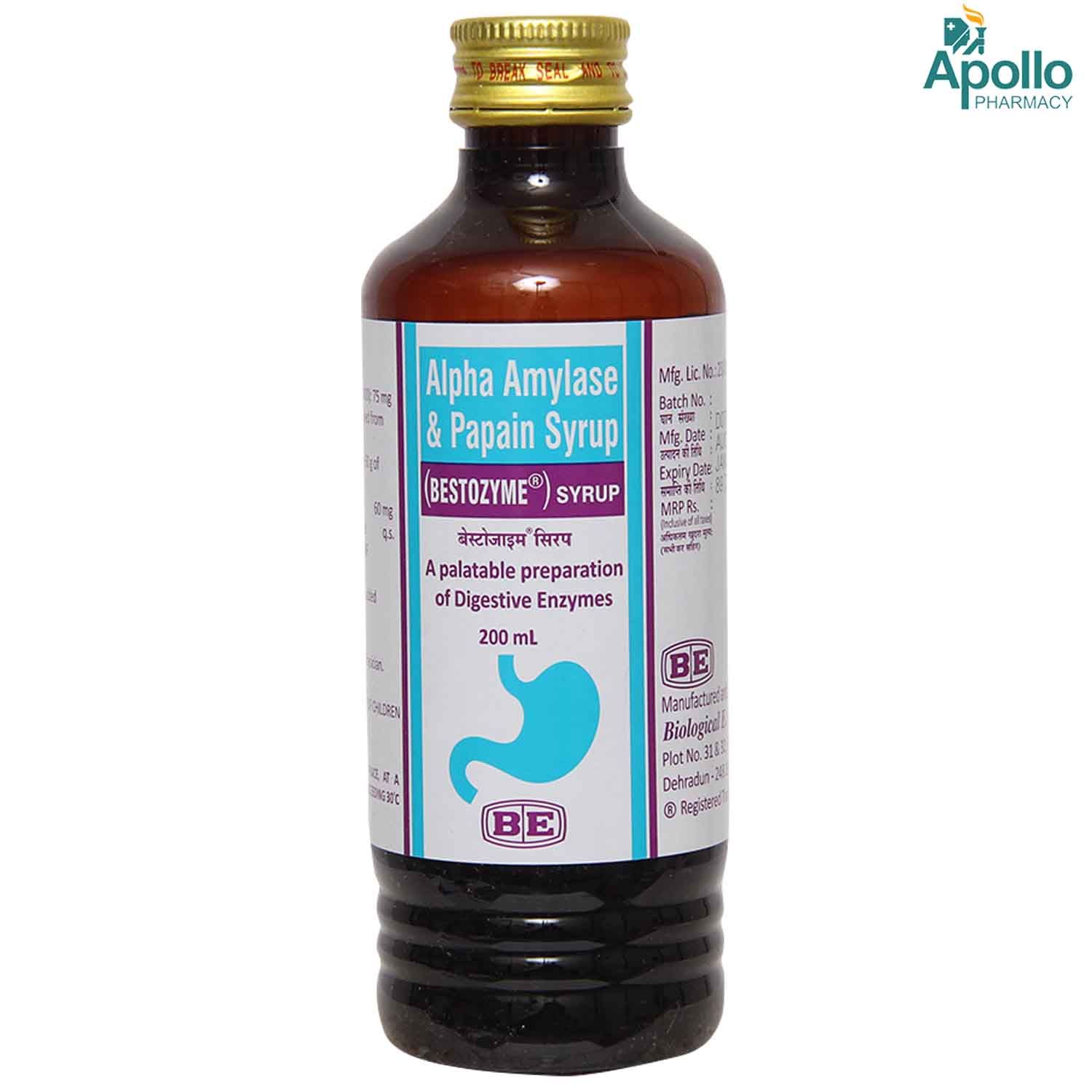Diapepsin Syrup 100 ml
₹74.25*
MRP ₹82.5
10% off
₹70.12*
MRP ₹82.5
15% CB
₹12.38 cashback(15%)
Free Delivery
With Circle membership
(Inclusive of all Taxes)
This offer price is valid on orders above ₹800. Apply coupon PHARMA10/PHARMA18 (excluding restricted items)
Know Your Delivery Time
Provide Delivery Location

Available Offers

Secure Payment

India's Most Trusted Pharmacy

Genuine Products
Composition :
Manufacturer/Marketer :
Consume Type :
Return Policy :
Expires on or after :
About Diapepsin Syrup
Diapepsin Syrup belongs to the class of 'digestive enzymes', primarily used to treat digestive disorders. It is used to digest starch, carbohydrates, fats, and proteins. Diapepsin Syrup effectively treats dyspepsia (indigestion), flatulence (gas), anorexia (eating disorder), heartburn, and post-meal abdominal distension (bloating and swelling in the stomach). Indigestion is the inability to digest food that is associated with pain and discomfort in the stomach.
Diapepsin Syrup contains Alpha-amylase and Papain. Alpha-amylase is an enzyme that works by breaking down or digesting proteins, fats and carbohydrates. It treats stomach fullness and indigestion problems. Papain is a proteolytic enzyme that breaks down protein. It improves digestion and treats infections, diarrhoea and allergies.
Please take Diapepsin Syrup in the dose and duration advised by your doctor. Diapepsin Syrup is generally safe to use. However, if you notice any unusual symptoms, please consult your doctor.
Please inform your doctor if you have any allergic reactions to medicines before starting Diapepsin Syrup . Intake of probiotics, prebiotics, and plenty of fluids is recommended to improve digestion. Pregnant and breastfeeding women should use the medicine with proper consultation and caution. It is advised to limit alcohol intake since it can further affect your digestion whilst taking this medicine.
Uses of Diapepsin Syrup
Directions for Use
Medicinal Benefits
Diapepsin Syrup helps relieve digestive disorders like indigestion, flatulence, anorexia, heartburn, and post-meal abdominal distension. It contains Alpha-amylase and Papain. Alpha-amylase is an enzyme that works by breaking down or digesting proteins, fats and carbohydrates. It is used as a digestive aid in indigestion and stomach fullness problems. Papain is a proteolytic enzyme that is extracted from the raw fruit of the papaya plant. It also has anthelmintic (treats parasitic worm infections) properties.
How Diapepsin Syrup Works
Storage
Side Effects of Diapepsin Syrup
Diapepsin Syrup is generally safe to use. However, if you notice any unusual symptoms, please consult your doctor.
What if I have taken an overdose of Diapepsin Syrup
Drug Warnings
Inform your doctor if you have any allergic reactions before starting Diapepsin Syrup . Sleep with your head elevated (at least 6 inches) above your feet can decrease any acid reflux symptoms. Intake of probiotics, prebiotics, and plenty of fluids is recommended if you are suffering from indigestion. Pregnant and breastfeeding women should use Diapepsin Syrup with proper consultation and caution. It is advised to limit alcohol intake since it can further affect your digestion whilst taking this medicine.
Diet & Lifestyle Advise
Please take foods rich in probiotics such as yoghurt/curd, kefir, sauerkraut, tempeh, kimchi, miso, kombucha, buttermilk, natto, and cheese.
Eat fibre-rich food like whole grains, beans, lentils, berries, broccoli, peas, and bananas to aid digestion.
Avoid intake of alcoholic beverages with Diapepsin Syrup as it can make you dehydrated and increase acidity.
Avoid overeating, eating too fast, eating high-fat foods, or eating during stressful situations that can burden your stomach.
Eating small meals at regular intervals so that stomach does not have to work as hard or as long.
Smoking can irritate the stomach lining; hence please avoid it.
Sleep with your head elevated (at least 6 inches) above your feet and use pillows. This helps digestive juices to flow into the intestines rather than to the oesophagus.
Habit Forming
Therapeutic Class
Diapepsin Syrup Substitute

Bestozyme Syrup 200 ml
₹0.67per tabletBestozyme-SF Syrup 200 ml
₹0.54per tabletBestozyme Syrup 100 ml
₹1.34per tabletDyzem Syrup 200 ml
₹0.69per tablet
Product Substitutes
Alcohol
Caution
It is recommended to avoid alcohol while you are being treated with Diapepsin Syrup . Alcohol consumption may further worsen your digestive issues.
Pregnancy
Caution
There is limited data on how Diapepsin Syrup affects pregnancy. Please consult your doctor if you are planning to become pregnant or already pregnant before starting Diapepsin Syrup .
Breast Feeding
Caution
It is not known if Diapepsin Syrup affects breastfeeding. Please consult your doctor before taking Diapepsin Syrup if you are a nursing mother.
Driving
Safe
Diapepsin Syrup does not affect your driving ability.
Liver
Caution
Please take Diapepsin Syrup with caution and the doctor's advice if you have a history of liver diseases/conditions.
Kidney
Caution
Please take Diapepsin Syrup with caution and the doctor's advice if you have a history of kidney diseases/conditions.
Children
Consult your doctor
Your doctor will decide the dose based on your child's age and body weight.
FAQs
Country of origin
Manufacturer/Marketer address
Disclaimer
Author Details
We provide you with authentic, trustworthy and relevant information











